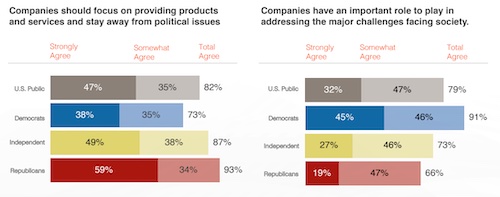For years now, companies operating in our politically polarized environment have been inculcated by an increasingly conscientious public to the notion that they must take a stance on some of the pressing social, environmental and political challenges facing the world today.
According to a recent report by APCO Worldwide, however, many Americans feel put off when businesses begin preaching politics—and a sharp partisan divide arises when it comes to what issues companies speak out on and how they do it.
APCO's report, which surveyed Americans in an effort to understand their views on Environmental, Social and Governance initiatives and what role they think companies should take in influencing these conversations, put a spotlight on the intense debate surrounding the topic of purpose-driven issues as well as the precarious position in which companies find themselves when navigating today's politically divisive environment.
 |
According to APCO’s report, a majority of Americans (82 percent) believe companies should stay out of politics altogether. Instead, most Americans believe the U.S. government is the preferred authority in addressing political issues. For example, 50 percent believe it’s the government’s responsibility to tackle racial inequality as opposed to businesses (21 percent), 51 percent believe the government is better suited to deal with our ongoing political polarization instead of the private sector (21 percent) and 50 percent believe it’s the government’s job to fight climate change, not companies (20 percent).
When broken out by party affiliation, the role Americans think companies should take when it comes to addressing social issues and challenges becomes stark along partisan lines. Among those who identify as Republican or Republican-leaning, 93 percent think companies should focus on providing products and services as opposed to politics, compared to 73 percent of Democrats. More than half (57 percent) of Republicans said they think companies should focus on their core business mission and stay away from current-event issues, while 39 percent of Democrats said they believe companies should speak out, take action or advocate on current events and issues as they relate to their business and in areas where they can make a meaningful difference. Similarly, 40 percent of Republicans think CEOs should stay quiet on current events and issues, compared to only nine percent of Democrats. Democrats, on the other hand, were far more likely (91 percent) to take the view that companies have an important role to play in addressing the major challenges facing society, compared to about two-thirds (66 percent) of Republicans.
That said, most Americans (79 percent) appear to agree that companies do have a role to play when it comes to addressing society’s most pressing challenges. And nearly three-quarters of the public (73 percent) expressed having a favorable view of ESG strategies, with social and governance initiatives receiving the most support (both 89 percent), followed by environmental (84 percent). Not surprisingly, Democrats were more likely to say they have a favorable impression of ESG (89 percent) compared to Independents (59 percent) or Republicans (61 percent).
More than anything, Republicans and Democrats appear particularly divided when it comes to what social and political issues they believe are appropriate for companies to take a stand on. Republicans especially believe businesses should stay away from issues such as abortion, gun control, refugees and border security, immigration, global conflicts and LGBTQ+ equality.
By contrast, Democrats most passionately believe companies should speak out on issues such as access to healthcare, mental health, income inequality, racial equity and discrimination.
Regardless of partisan affiliation, Americans widely believe that actions speak louder than words when it comes to corporate-issue advocacy. More than three-quarters (78 percent) think making changes via internal policy is the most appropriate response to a current social event or issue, as opposed to external actions such as speaking out on an issue to the media (61 percent). When broken out by party affiliation, Democrats, Republicans and Independents all agreed that taking action internally is preferable to a company simply speaking out on an issue publicly.
APCO’s report, “Pulse Check: It’s Time to Recalibrate—Surprising Truths About Corporate Advocacy,” was based on a survey of more than 2,000 U.S. adults in October.


 A growing number of consumers, company employees and even PR professionals now think companies should dial back on ESG initiatives, according to the latest Global Communications Report from USC Annenberg.
A growing number of consumers, company employees and even PR professionals now think companies should dial back on ESG initiatives, according to the latest Global Communications Report from USC Annenberg. Shareholders filed a record 535 environmental, social and governance resolutions for the upcoming proxy season, according to a report by As You Sow, Sustainable Investments Institute and Proxy Impact.
Shareholders filed a record 535 environmental, social and governance resolutions for the upcoming proxy season, according to a report by As You Sow, Sustainable Investments Institute and Proxy Impact. Teneo has tapped Pia Heidenmark Cook, former chief sustainability officer for IKEA, as a senior advisor in its London office.
Teneo has tapped Pia Heidenmark Cook, former chief sustainability officer for IKEA, as a senior advisor in its London office. How doing the right thing builds brand loyalty and creates untold opportunities for communications professionals.
How doing the right thing builds brand loyalty and creates untold opportunities for communications professionals. Arielle Gross Samuels, global head of environmental, social and governance activity at Mark Zuckerberg’s Meta, is joining Blackstone, the world’s largest alternative asset manager and commercial real estate owner.
Arielle Gross Samuels, global head of environmental, social and governance activity at Mark Zuckerberg’s Meta, is joining Blackstone, the world’s largest alternative asset manager and commercial real estate owner.


 Have a comment? Send it to
Have a comment? Send it to 
Nov. 18, 2022, by Joe Honick
Jon’s interesting report about APCO’s interesting report makes for stimulating and interesting reading if any of the tens of thousands of publics already polled about everything can be relied on. One of the problems with this interesting report is the apparently reliable array of other surveys, reports and essays suggesting or asserting “those surveyed” don’t have much confidence in the government, business, media or almost anyone anyhow.
Among other things, how would any of “those surveyed” feel if they found out more than a few corporations who deserted the right after J6 seem to have found their financial paths back to the Republicans?